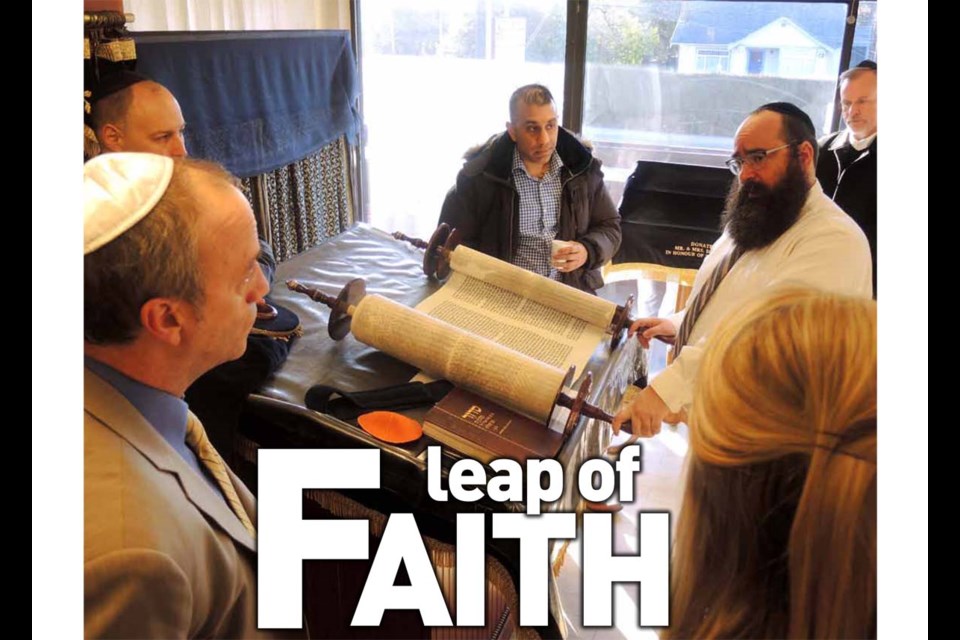Listening intently, with some shielding their eyes from the early morning sun breaching the windows on the second floor of the strip mall, 22 people were hanging on Rabbi Yechiel Baitelman’s every word.
For most of the men in the audience of national security agencies and first responders from Richmond and beyond, it was likely the first time they’d worn a kippah.
Standing in front of the “Holy Ark” — a Torah of three, hand-written scrolls containing more than 300,000 letters from the first books of the Hebrew bible — Baitelman told of what life may look like without law enforcement.
“The (enforcement of the law) is an integral part of a civilized society,” said Baitelman, a rabbi from the community of Chabad Richmond, which has a “Jewish centre” on Blundell Road at Railway Avenue.
“Richmond is essentially a safe place to live; just the other day this young First Nations man came up to me in Safeway and asked if I was a rabbi. He shook my hand. That wouldn’t have happened in my native New York.
“But sometimes people will shout derogatory stuff out of the car on a Friday night, when they’ve perhaps had too much to drink.
“There are security issues around the world and we’re very aware of that. But we just want to live in a safe and peaceful place.”
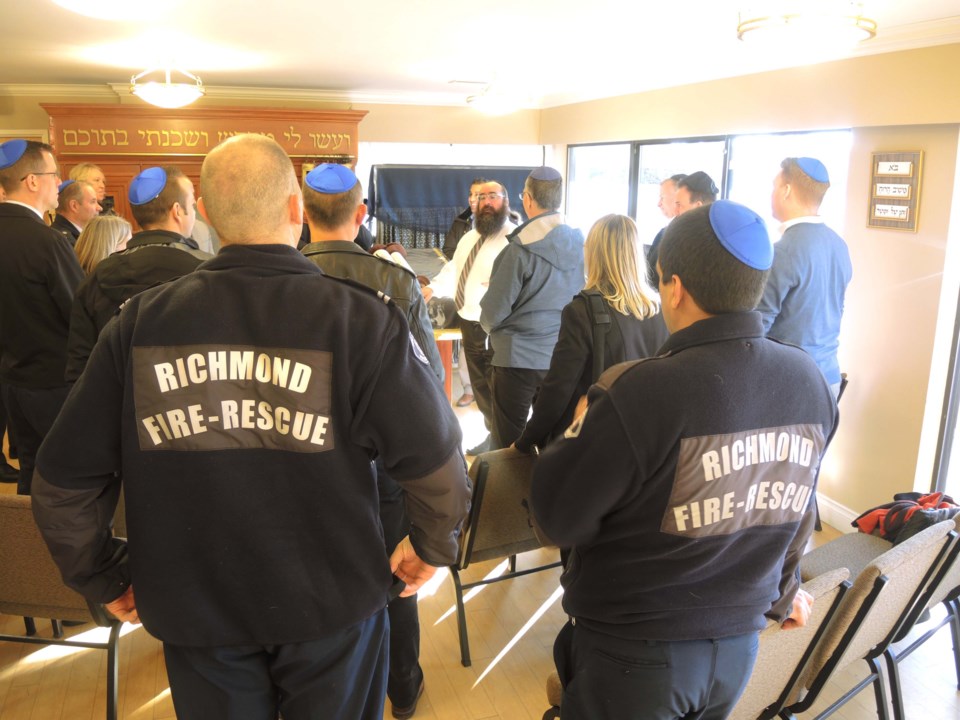
There are approximately 4,000-5,000 Jews living in Richmond, the second biggest population of its kind in the Lower Mainland.
However, Baitelman said not everyone in the Jewish community thinks the same way; “we all have very strong opinions of what is happening in Israel and around the world. We frequently don’t agree, but we must be respectful.
“We talk about tolerance, but that’s not enough. We need to respect each other, we believe that we are all here for a reason and a purpose.
“But you don’t need to understand everyone to respect them. Even if you don’t understand them, it doesn’t make them any less godly.”
There are, however, added Baitelman, “security concerns in the community,” before making reference to Sunday’s deadly shooting of six people in a Muslim mosque in Quebec City.
“Quebec was a tragedy and was an assault on every one of us Canadians,” he said.
Asked by a member of Richmond Fire-Rescue about the etiquette of first responders attending an emergency inside a place of worship, such as a synagogue, Baitelman said the “preservation of life is more important.”
“If it’s a question of stepping over books and saving someone’s life, then the life is always more important; we will deal with the books later.
“That’s one worry that shouldn’t be on your mind.
“We also believe in the preservation of life, even if it is breaking the law. You can take someone’s life, if they’re threatening the life of another.”
When asked about the different Jewish faiths in Richmond and the Lower Mainland, Baitelman talked first about how he, and others in his community, consider themselves Canadian, not Jewish-Canadian.
“We are not membership-based; we are more of an outreach organization, with 400 donors, some of whom I’ve never met,” he said.
“And we don’t call this a synagogue; more a centre for Jewish learning and living.”
‘Sense of unease’ after Quebec
About two blocks south of Chabad, the fellow Jewish congregation of Beth Tikvah — on Geal Road, near Williams Road and Railway Avenue — the tour was welcomed with open arms by the “less obviously Jewish” Rabbi Howard Siegal.
“You may notice I don’t have a beard,” smiled Siegal, referring to his colleague at Chabad and describing his congregation as being a “non-orthodox, conservative movement.”
That wasn’t the only marked departure from Beitelman’s Chabad; the men were now wearing different coloured kippahs and were in a much more formal setting than the second floor of a strip mall.
The ornate room, festooned with murals, symbols, flags and architecture was tempered by the casual dress and disarming manner of Siegal.
And in recognition of the likely diverse crowd in front of him, Siegal asked if they were Christian, Muslim, Hindu, Buddhist or even atheist?
The atheists seemed reluctant, at first, to put their hands up. When they did, Siegal suggested they may, in actual fact, be agnostic.
“Atheists absolutely don’t believe; an agnostic doesn’t think there is, buuuuut, if God should show up…”
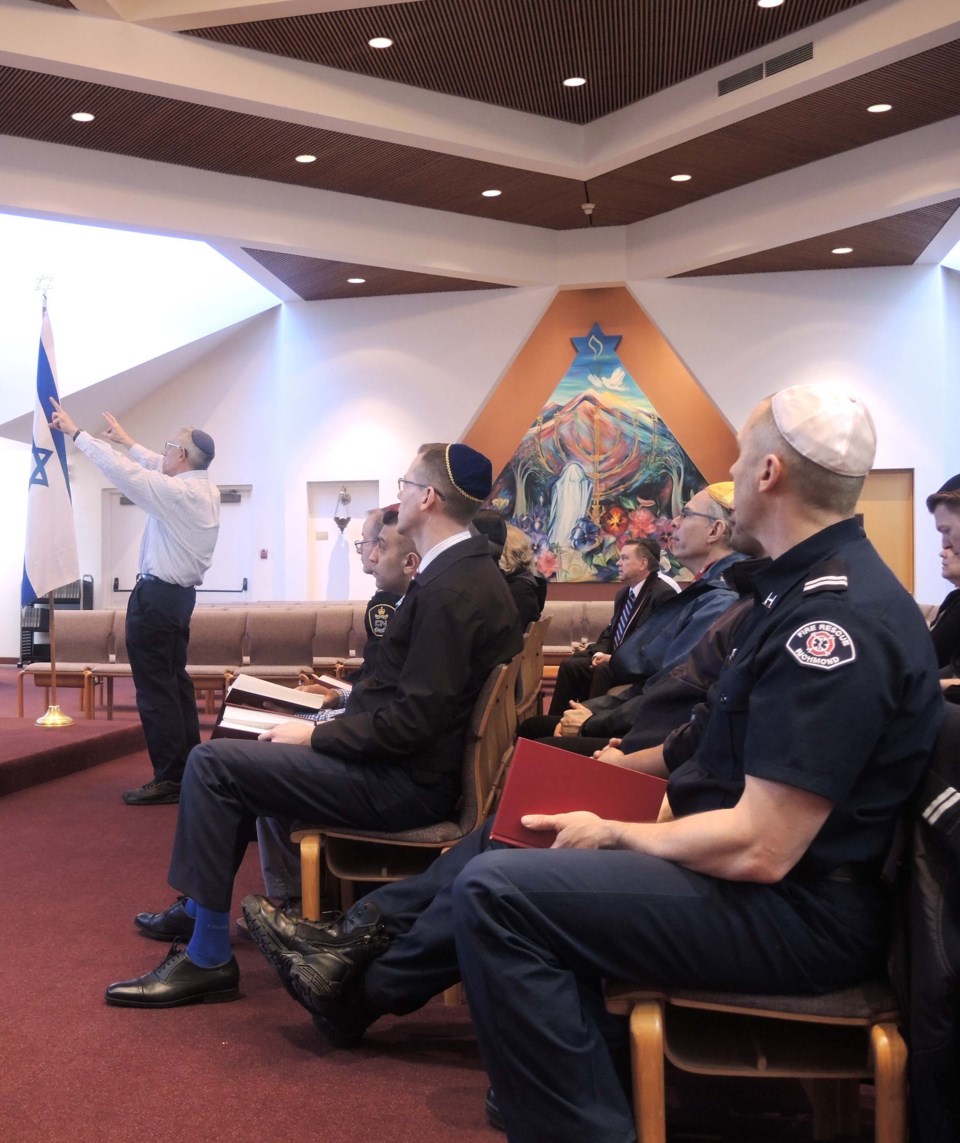
Explaining the “differences of agreement” in Israel, where the orthodox movement is intertwined with the Israeli government, creating a lot of tension, Siegal said the Jewish people “all believe in the same God.”
Referring to the scrolls behind him, as like Baitelman, Siegal told of how the 4,000-year-old words are continually re-interpreted on a regular basis, because “they don’t translate directly to life today.”
“An eye for an eye, for example, has been re-interpreted to mean you will need to compensate me for the loss of that eye,” he said.
Given the make-up of his audience on the day, Siegal inevitably spoke of security in Richmond and in Canada.
“I do feel safe and secure living in Richmond; but I do remember not too long ago the swastikas on garage doors here,” he said.
“I remember telling my great, grandparents, who don’t live here, about the swastikas and anti-Semitism in Richmond and they just laughed and said ‘that isn’t anti-Semitism, anti-Semitism is someone burning your house down.’
“I agree that it’s not the same, but it is a symptom. We can’t live with that and they do become concerns.
“Our synagogue was concerned at the time and we did beef up security here. I wouldn’t say we still have a sense of fear, but there is a sense of unease, perhaps.
Referring to the tragedy in Quebec on Sunday, Siegal said there is still a sense of “it can’t happen here.”
“Nobody would have ever thought it would happen in Quebec. None of us want to believe it will actually happen to us. But we have to be more concerned about the people around us and challenge ourselves here in our synagogue to remind ourselves of that.
“You see events such as in Quebec and you can see it’s starting to come here. But when you start demonizing one religion, you start demonizing them all.”
Think of hijab before acting:
Islamic sheikh tells tour group to ignore religious customs if lives are at stake
Just because a woman is running out of the room, it doesn’t mean she’s trying to escape or to arm herself.
Sheikh Murtaza Bachoo, an imam at the Az-Zahraa Islamic Center on No. 5 and Blundell Roads, described to his audience of police personnel and first responders the subtle difference between a suspect reaching for a gun and a Muslim woman dashing for her hijab.
“This is important for your line of work,” said Bachoo, during a presentation he was giving at his mosque, as part of a day-long goodwill and understanding tour of visible minorities’ religious facilities on Wednesday, which included visits to Richmond’s Jewish synagogues.
“If you enter a Muslim household and a woman sees a male officer, she may bolt into the next room. She isn’t necessarily running to get a weapon.
“I understand that’s what you may think, that’s what you’re trained to do. But you should consider the alternative.”
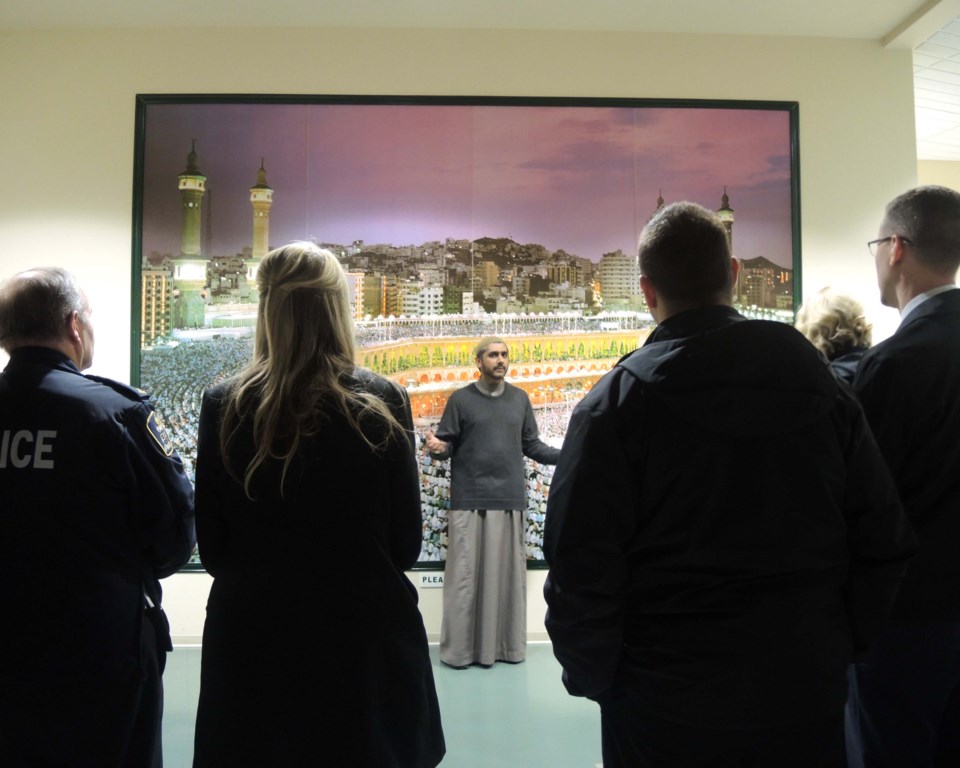
Moments earlier, the entourage of about 22 leading personnel from 10 agencies — including the CN Police, RCMP National Security, Richmond RCMP, Richmond Fire-Rescue, private security firms, Corrections Canada and police forces from across the Lower Mainland — had taken off their shoes, as per the Muslim custom, before being escorted to the “male side” of the mosque.
The group was educated on Arabic terms, the percentage of Muslims who speak Arabic and a quick lesson on the history of Muslim migration to Canada, which started in 1865, before proliferating in the ‘60s and ‘70s to the now 1.2 to 1.3 million people of Islamic faith in the country, 90-120,000 of whom call B.C. home.
Only a very few of those Canadian Muslims, said Bachoo, wear the niqab, which covers almost all of the face, as opposed to the aforementioned hijab, which covers only the head and neck areas.
“If there is a female officer with you, perhaps ask her to identify the woman,” he added, referring to the occasions where an officer of the law needs to identify someone wearing the niqab.
“If (there isn’t a female officer present), ask her to pull down the niqab for a few seconds; there is a possibility she won’t, it will depend on her.”
Bachoo explained to the group the thinking behind the hijab and niqab, which a Muslim woman has to wear when she leaves the house or in the presence of males outside her immediate family.
“She doesn’t want to be recognized as a woman, she wants to be recognized for who she is,” said Bachoo.
“And if someone is looking down when talking to you, it may not be because they’re suspicious or are trying to hide something; it’s a mark of respect.”
If a Muslim, continued Bachoo, is “more engaged in their faith, it doesn’t mean they are extremists.
“Political activism is not an indication of extremism; we want our young Muslims to be politically active and sometimes they have been unfairly scrutinized by police.”
Islamophobia affecting daily life in Richmond
Sunday’s tragic events in Quebec City — where six Muslims were shot to death during a targeted attack in a mosque — were clearly at the top of Bachoo’s mind when he broached the subject of Islamophobia.
Making a direct link to the deadly shooting, Bachoo said Islamophobia is a growing concern for his community, even in Richmond and in the Lower Mainland.
“Attacks around the world are increasing all the time,” he said.
“I don’t have to make a case; just look at Quebec, that was an act of terrorism, plain and simple.
“It’s affecting the lives of our children and their parents every day. It’s not nice for children to be called ‘Osama Bin Ladens’ all the time. Mosques are being attacked and burned down all over the world.
“People are (phoning) here saying ‘the only good Muslim is a dead one,’ after watching American Sniper.
“Women are being physically and verbally abused on the SkyTrain.
“When they report these things, I would ask you to take it seriously and follow it up.”
The group learned of Muslim customs, such as hand-shaking (or the lack thereof), why they use coin-sized prayer tablets and why a Muslim would never throw down the Qur’an.
“We pray five times a day and you will often hear us asking where north is, as we sometimes need to pray wherever we are,” said Bachoo.
“But the most important prayer is Friday’s prayer.”
Fasting during Ramadan, the pilgrimage to Mecca and dietary requirements (including no pork or alcohol) were also communicated before tackling the thorn of “jihad.”
“This term is usually associated with violent acts,” said Bachoo.
“But it is important to understand what it means to mainstream Muslims, such as us, and what it means to radicals.
“Every time there is a struggle for a mainstream Muslim, that is a jihad.
“This, for example, is what Martin Luther King and Nelson Mandela had. They had a jihad, a struggle.
“There is no room for killing in our faith.”
Asked by a member of the group what he thought of the supposed push for Sharia Law — which some people feel flies in the face of most Western values — in some parts of North America, Bachoo cautioned again about people’s understanding of the term.
“Sharia is a path or a way of life (practices, diet, dress), it doesn’t mean we are demanding Sharia Law,” he said.
Asked if, in the case of a medical emergency, first responders need to take off their shoes when entering a mosque, the answer was a flat “no.”
“Our laws are only observed in normal circumstances,” said Bachoo.
“And that would also apply to fasting during Ramadan. If it affects your life badly, then it would be considered haram (harmful).
Before giving a prayer demonstration, Bachoo also explained that, if you see a Muslim praying, “they may not be able to break that prayer to talk to you, unless it’s an emergency; they’re not being disrespectful.”
* The Az-Zahraa Islamic Center, at 8580 No. 5 Rd., is inviting the community to a prayer circle and candlelight vigil Friday, Feb. 3 at 7:30 p.m. to honour the Quebec victims.
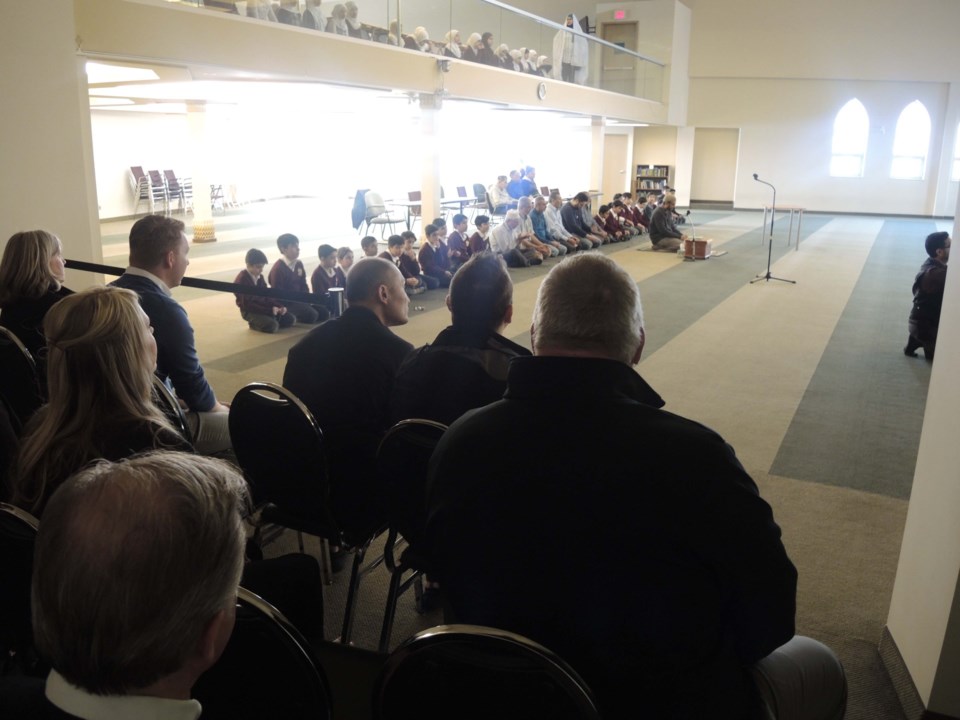
Holy tour’s goals reached, breached: Richmond RCMP
Although it was planned weeks ago, Richmond RCMP’s Cpl. Kevin Krygier recognized the significance of the timing of the security personnel tour of two of the city’s “more vulnerable” communities.
It just so happened Wednesday’s event — which took in two Jewish synagogues and two Muslim mosques — came three days after the atrocity in Quebec City, where six people were shot to death inside a mosque.
The 22 people from 10 different security agencies and first responder services were brought together after a “collaboration” between Len vanNieuwenhuizen, of the RCMP National Security community outreach program, and Krygier, of the Richmond detachment’s Crime Prevention Unit.
“We’re always trying outreach and Len had been to see the people at Az-Zahraa (Islamic centre in Richmond). They suggested that we should invite everybody out and give them a tour,” Krygier told the Richmond News.
“Our members go by there once a week and actively engage with these (Muslim and Jewish) groups.”
Krygier said the group heard first-hand, valuable information from local Muslim and Jewish leaders about what it means if a woman tries to bolt from a room and how to react if there was a fire in a synagogue.
“It has given us a greater depth of understanding and it was great to hear all that in one shot,” added Krygier.
“I think we’ve exceeded our goals; people were very pleased. I think most of them, if not all, walked away feeling very much more informed.”
Brian MacLeod, Richmond Fire-Rescue’s community relations officer, said he thrived on the opportunity to learn more about the different cultures in Richmond and to find out what they need from first responders.
“Getting to make direct contact with the leaders in these groups was invaluable and will undoubtedly help us with education and talks,” said MacLeod after the tour.
“I was very educated today; I knew a little about the two cultures, but this has been a huge benefit to me.
“This will go further than just fire prevention; I don’t think these groups fully understand the services we provide and this will help with that.
“What I learned today will filter down in the department’s training. ‘Life first’ is the strongest message I took away.
“We’re not supposed to take off our boots, so it was great to have some clarity in terms of emergency response.
“We kind of know these things, but to hear it directly from the group’s leaders will take a bit of pressure off first responders.”
